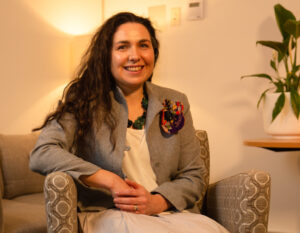
Dr Joanna Menger Leeman | Psychologist
Dr Joanna Menger Leeman | Psychologist
BBSc (Hons), MPsych (Child and Family), PhD, MAPS
In my work as a psychologist I am drawn to working developmentally with pre-schoolers, children, adolescents, parents and adults.
I am experienced in providing psychological therapy for varied presentations including complex trauma, depression, anxiety, parent-child relationship difficulties, developmental disorders, school refusal, and grief/loss.
I have a special interest in developmental / complex trauma (child abuse and neglect and other adverse childhood events) with people of all ages. My PhD research explored intergenerational effects of child abuse and neglect and the resilience and recovery of survivors.
Healing complex trauma is possible.
My work is trauma-informed and follows the Blue Knot Foundation’s Practice Guidelines for Treatment of Complex Trauma and Trauma Informed Care and Services Delivery (ASCA (Now Blue Knot Foundation), 2012, 2019)
My work is informed by clinical insights from affective (emotions), cognitive (mind), psychodynamic, somatic (body-based) and bioecological (dynamic systems) approaches.
Approaches include acceptance and commitment therapy (ACT), cognitive behavioural therapy (CBT), Eye Movement Desensitization and Reprocessing (EMDR), expressive therapies including child-centred play therapy, small figure psychotherapy, sensori-motor psychotherapy, and sensory modulation.
An interview with Dr Joanna Menger Leeman
Why did you become a psychologist?
I became a psychologist because I like people, I like the way they shape their own lives and the stories they have.
What are you passionate about in Psychology?
In psychology, my passion is intergenerational trauma and trauma from child abuse and neglect. Sometimes people have had their own experiences of that and understanding how people can work at resilience and finding what they need to go forward.
What gives you a sense of satisfaction?
It’s really satisfying to be with someone where they’re at. It’s great when people notice their own wellness and move into a space of checking that out.
What can a client expect in their first session?
In the first session, you’ll probably expect way too much talking. It’s a space that I really want to get to know you, who you are, what you like, what you’ve done before. You might have had psychology before and tried things out some things that might be good and some things that might not be wanted again. So to have a really good understanding of you in that first session, get to know you and make some plans together.
